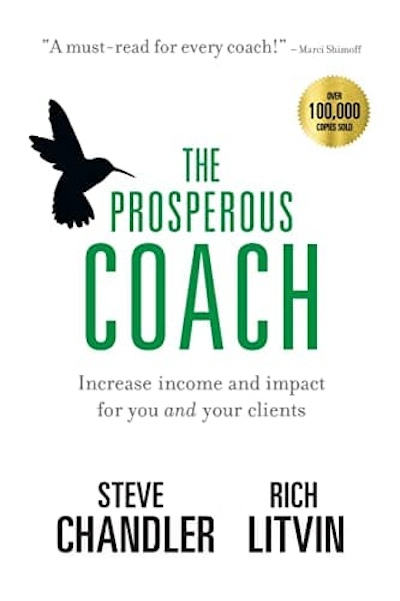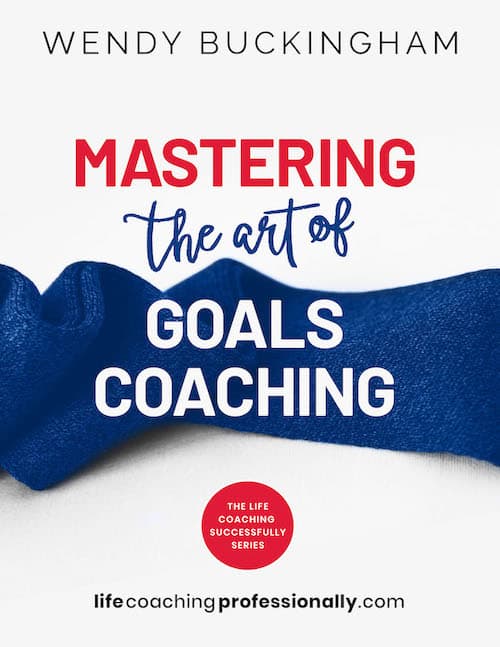Life Coaching Fees: How To Decide What To Charge
Page Summary
Working out what to charge for life coaching is a challenge that depends on so many things. This page discusses how to determine your life coaching fees, the best ways to get paid, how to elegantly raise your fees and some of the fee setting traps to avoid.
Quick Links
I may receive commissions at no cost to you. I participate in the Amazon Services LLC Associates Program. More...
Working Out How Much To Charge For Life Coaching

One of the most common questions you are going to be asked by prospective clients is "What does your coaching cost?"
It's a question many new coaches have trouble answering confidently and congruently because they are not sure how much to charge for their coaching.
Maybe they question their value, or what is right for their target market or even how much they need to earn from coaching to as a viable career.
Working out your what to charge will depend to a great extent on your experience, what other skills you bring to coaching, how you market yourself and the niche and/or demographic you work within.
7 Basic factors that can determine the life coaching fees you can charge
- How you deliver your coaching programs; i.e. face to face, or online/phone.
- The length of the sessions.
- Whether you offer group or personal sessions.
- The niche or demographic you target and what they can afford or are prepared to pay.
- Your experience, background, credentials and certification level.
- Your location and your client's location both nationally and internationally.
- Your personal expenses and overheads.
Know your personal expenses:
Of course you may not be able to cover all your expenses and make a profit with your life coaching fees when you first start coaching, but it's important to know what you need to aim for if your coaching is to be financially viable as a living.
If you are not sure of your expenses, I suggest keeping a simple spread sheet of what you spend for a month or two. (You may get a fright 😀). It's also a good idea to include a ballpark figures of what marketing expenses you want to budget for.
These will include, depending on your choices, items like business cards, website hosting, advertising, networking events, ongoing trainings, association memberships and so on.
With the increased popularity of coaching online using platforms such as Zoom or Skype, even phone, some coaches are choosing to charge a loading if the client wants physical face-to-face coaching. This compensates for time and travel considerations for both the coach and the client. Of course, this could also be marketed to clients as a discount for coaching online rather than extra for face-to-face.
4 Common Traps In Setting Life Coaching Rates
These are common traps that new coaches can fall into when setting their life coaching rates.
1. Avoid the fee comparison trap
There will always be a coach who charges more or less than you do, so don't fall into the trap of making comparisons and thinking "I should be charging more/less".
Some may set their life coaching rates at as little as $USD50 an hour for 1 on 1 coaching while some executive and celebrity coaches can achieve $USD1500+ a session or more.
Comparing will only cause you stress. The chances are there is little real comparison with your offering. You really won't know what criterion they have used to justify their life coaching fee or if, in fact, their fee is justified at all!
High fees are not always a guarantee of better coaching
or low fees an indication of poor coaching.
However, the more your skills develop, the more your reputation grows and the harder it is to book to be coached by you, the more you can charge!
2. How you set life coaching fee may depend on your background
Many coaching schools recommend you start practicing pro bono as part of your training. (Pro Bono is a latin phrase that is commonly used to describe professional work that is done for free or as a volunteer.)
If you come from a related discipline such as psychology or
counselling, where you have simply incorporated coaching qualifications and techniques to your
offering, you may have no problem charging your exisiting full fee straight away.
But if you are coming into coaching without any related training or useful industry or other experience to compliment your niche then offering to coach people for a reduced rate, or some other exchange, may make sense to help you gain experience and confidence.
However, if you are really confident you know what you are doing, go for it and start charging a full rate straight away. It's whatever you feel confident with and whatever your niche will bear.
Life coaching fees are not set in stone - you can always adjust up or down at any time.
Be willing to experiment.
3. Not valuing the benefits of your coaching skills right from the start
Even if you are just trained and certified you will be giving valuable help to anyone you coach right from the start. So don't be too willing to give away your coaching. If the client is paying you a fee however small, or some other exchange, they will be more inclined to take the process seriously.
And it's a good idea to let those early practice or swap sessions you might have with another new coach go through the full process of your coaching agreements. And with the early paying client you may offer to coach at a discount, be sure to let them know what your full life coaching rate will be for future clients. This will make them more appreciative of the opportunity to be coached for practice or at a reduced rate.
In my page about bartering and swapping your services (see the link at the bottom of this page), I enlarge on how to make swapping your coaching services with another or for some other form of exchange best work and how to avoid the traps.
4. Being too quick to offer a discount

Often when a prospective client starts pushing you to reduce your fee with an "I really want to do this, but can't afford it" story.
It's often more about their priorities and choices than whether they can afford your coaching. And as a new coach it is easy to fall for this story.
On two occasions early in my coaching career, anxious to sign up clients and believing their story, I seriously
discounted my fee. During the coaching process I discovered that the clients were actually in a
much better position financially than I was at that time.
In the first instance the client was saving for an extended overseas holiday and in the second carrying out major house renovations.
This made me feel somewhat resentful, undervalued and cheated. Not the best place to be coming from as a coach!
So, I suggest it is much better to change or adjust the structure of the coaching offered. For instance the number of sessions in a package or length of the sessions. I believe it's better to have packages that cater for several budgets than have one package where you may be asked to discount.
And, of course, it's your option to offer someone, who is genuinely unable to afford you but you really want to help, pro bono coaching. Maybe in your fee set up include one or two coaching "scholarships". I did this with two people who were working free of charge for volunteer organisations.
The Prosperous Coach by Steve Chanler and Rich Levin is a book you may find adds to the mix of information and helpful when deciding on your fees and raising them.
It has some interesting coaching tips to help you reach a good ROI or ROCI (return on (your) coaching investment😊 and sets out a creative perspective on how to coach to engage, inspire AND charge what you are worth.
The book is a best seller with many rave reviews. It’s a bit pricey, but that follows the philosophy of the authors around charing what you are worth. Check out the sample and judge for yourself.
How About Group Coaching Rates
Knowing what to charge for group coaching is often quite a dilemma. Again, it will depend on your niche and demographic. As with one-on-one coaching groups you will be able to charge more than for say business or commercial groups than a community group with a low budget or a group from a low income demographic.
Many coaches follow this group life coaching fee formula:
Say you are providing a series of six one-on-one coaching sessions for $1200. For six group coaching sessions you could charge each participant 25% ($300) earning yourself $1800. In this scenario you need to aim for more than four in the group or you will only earn the same as coaching one-on-one.
Of course you can vary the cost and the percentage with whatever feels right for you with what you are offering the group. For instance if your group package includes some individual coaching or other valuable add on you may feel justified in charging a higher percentage of your one-on-one fee.
For groups you initiate and promote, I'd recommend getting the fee upfront rather than session by session. You will then have a definite commitment for the number of sessions in the series. You can of course offer a refund policy which I go into more in on my related page on life coaching agreements, at the bottom of this page.
If you are asked to quote for coaching a group by an organisation, you could use the same format above or charge a base rate for a given number of participants, say 10, and extra for each participant over that number.
Coaching Rates For Packages Sessions
There are advantage in offering packages of coaching sessions rather than charging as you go by session, hour or month. The client is then committed to work with you for a period of time to achieve their outcomes. Also by offering several different packages you can make your coaching affordable to a wider range of clients.
I offered several different program options so there was something for most needs and budgets. The variations in your programs can be for length of sessions or number of sessions in a series and whether you include in between session email or text contact or brief telephone calls. You could also offer a discount for online rather than face to face coaching.
Here are some suggestions around putting your packages together.
- You can work out your packages on your hourly rate, charging less per hour the more sessions in the package. This means there is a real advantage to the client for signing on for a package with more sessions.
- I used to offer three packages - three, six, and eight sessions - and found it worked to recommend the middle package of six whilst the package of three was good for those keen but on a limited budget. Of course you can decide how many sessions you want to include in your life coaching package. At the end of the series the client could either sign up for a further series or have single sessions as needed at the per sessions rate they were paying for the package.
- Many coaches offer monthly packages and specify how many sessions to be taken each month. I see a disadvantage of this is that "life happens" and as some clients invariably need to reschedule, this can disrupt the monthly plan. However, it's a matter of experimenting to see what works for you.
How And When To Raise Your Life Coaching Fees

Let's assume you have really begun to grow in confidence as a life coach.
You have identified your coaching niche or ideal client demographic, your coaching calendar is full and you know from the feedback you are delivering quality results.
It could be time to increase your fees and capitalise on your experience and popularity.
Here are six ways to help you decide if the fee you are now charging is still appropriate or it is time for a raise.
1. Do some market research
If you haven't already, find out what other well established coaches in your field are charging. Keeping in mind the 'Don't Compare' edict above. Make sure what they are offering is similar to your coaching service.
2. Review the type of clients you are working with
Have they changed since you began coaching? Have you changed or added to your niche since you began coaching?
For example you may have started to attract a more prosperous client or even feel you have grown enough as a coach to focus on a market that was more commercially rewarding for you.
3. Have you gained extra specific qualifications?
For instance have you taken extra courses in team coaching, business coaching, or even some types of therapy that compliment life coaching such as NLP (Neurolinguistic Programming). This can make your offer of coaching more attractive and more lucrative.
4. Have you gained extra levels of qualification?
Accreditation such as going from credentialing as, for instance, an ICF (International Coaching Federation) ACC, to PCC to MCC can give you extra credibility which may be valued, especially in corporate situations where HR has to justify your engagement.
5. Do you have publicly displayed testimonials?
Legitimate client testimonials to your coaching success are gold. They are '"social proof" of your skills and act as a documentation for your credibility as a successful life coach. Display them on your website, any brochures or other promotional material you may develop.
6. Have your own expenses risen?
Easy to overlook but just by itself, this element can be a really good reason for increasing your rates. Are you now renting office space. Have you invested in a VA (virtual assistant) - what else. Go back up to the idea of the Excel spreadsheet that I mentioned earlier and update it. It will tell you how much you NEED to increase your fees, irrespective of any of the other reasons in this list.
Elegantly Increasing Your Life Coaching Rates
Over the years I found this method worked well
- The increase in your fees may need to be delicately communicated to existing clients on a monthly agreement or about to continue at the end of a package series in a conversation. If some of them are under genuine financial stress you may even lose them and so you have to be willing for that to happen. Or you may decide to keep their fees at the original rate or with a lower increase.
- The golden rule is communication, so don't ever let your increase in fees to existing clients be an unannounced surprise in your invoice.
- All new clients would, of course, be charged at the new rate so they would not have known the old rate!
Calculating Life Coaching Fees For Different Countries
The options are to have a fixed rate for all countries in say US or UK currency or adjust to suit different cultures and economies.

If you are planning to coach in one of the other countries where the profession is comparatively new, you may need to do some research and then use your local judgement as to what the market will accept depending on your niche or demographic.
If you are marketing your coaching worldwide, you should consider having a currency converter on your website so that prospects can immediately see your fees in their local currency.
Is Publishing Your Coaching Rates A Good Idea?
A dilemma coaches often face is whether of not to publish their life and business coaching fees on their website or in printed brochures. Let's look at the pros and cons for both strategies.

The pros:
The argument in favour of publishing your costs is that it tells the prospective client right up front what you charge and saves that "money conversation" that you may find uncomfortable at the end of an introductory session.
The first question a prospect invariably asks at the end (or even the beginning:) of an introductory session is "how much does it cost". I certainly favour being upfront around fees as it served as a filter. Visitors to my site could see whether they could afford my rates and the packages I was offering.
The Cons:
Many coaches feel that until you have had an introductory or Discovery Session, the prospective client might not realise the value of your
offering and why you are charging that amount. The may, decide against engaging you as their coach even before speaking to you.
However, if your website has properly engaging relevant content they should be pretty well sold on having you as their coach before you actually speak to them in the Discovery Session. I experimented with and founding that publishing details of my coaching packages and what they cost, worked best for me.
Ways To Get Paid Online And How To And Avoid Hidden Fee Traps
If you only have clients in your own country, then how you get paid is pretty simple. There maybe fees involved for direct debit, checks and online services such as Paypal, but they are transparent and easy to follow.
However, when it comes to getting paid by international clients, whether for your coaching or products, it’s a different matter and needs much more attention to detail if you are to get the best deal.
Check out the related pages link at the bottom of this page to find how to identify and avoid those hidden fee traps and charges that are often added to online payments and can really reduce your income.
How Did You Arrive at Your Life Coaching Fees?
There are many ways to establish Life Coaching Fees.
Will you share yours?
New coaches will be really grateful for information
on how you started charging and what you did
to get your fees to where they are now.
Please share your experience...
What other visitors have contributed about setting coaching fees
Click below to see contributions from other coaches...
Just Getting Started
I am a retired, Licensed Professional Counsellor who likes to stay active. As a private practitioner in Wisconsin for nearly 20 years the majority of …
The Difference Between Being A Self-Employed Coach And Getting Paid A Salary To Work For Someone Else!
This great article on life coaching fees was …
Giving away too much in the introductory session
Have you ever done a free introductory session with a prospective client and ended up giving away so much valuable coaching in that session, and then they …
Download my eBooks for extra coaching value and resources
I have also written a range of informative books (all from my own 25+ years' experience) that will help you to authentically attract new quality clients, increase your coaching skills and promote your coaching services.
Only available as a 60 page color PDF.
100% Satisfaction or Your Money Back
I am sure you will get real value from each of these books. However, if within 30 days of purchase you are not 100% completely satisfied, you will receive a full 100% refund.








